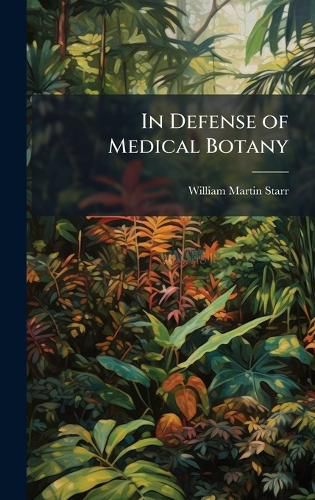Readings Newsletter
Become a Readings Member to make your shopping experience even easier.
Sign in or sign up for free!
You’re not far away from qualifying for FREE standard shipping within Australia
You’ve qualified for FREE standard shipping within Australia
The cart is loading…






"In Defense of Medical Botany," penned by William Martin Starr in 1891, offers a compelling rationale for the continued study and application of botanical medicine. At a time when conventional medicine was rapidly advancing, this work champions the enduring value of plant-based remedies and the rich history of herbal treatments. Starr's defense underscores the importance of understanding the natural world's contribution to healing and health.
This book provides insights into the perspectives of late 19th-century medical practitioners who sought to integrate traditional botanical knowledge with emerging scientific approaches. It serves as a valuable resource for historians of medicine, botanists, and anyone interested in the intersection of nature and health.
This work has been selected by scholars as being culturally important, and is part of the knowledge base of civilization as we know it. This work was reproduced from the original artifact, and remains as true to the original work as possible. Therefore, you will see the original copyright references, library stamps (as most of these works have been housed in our most important libraries around the world), and other notations in the work.
This work is in the public domain in the United States of America, and possibly other nations. Within the United States, you may freely copy and distribute this work, as no entity (individual or corporate) has a copyright on the body of the work.
As a reproduction of a historical artifact, this work may contain missing or blurred pages, poor pictures, errant marks, etc. Scholars believe, and we concur, that this work is important enough to be preserved, reproduced, and made generally available to the public. We appreciate your support of the preservation process, and thank you for being an important part of keeping this knowledge alive and relevant.
$9.00 standard shipping within Australia
FREE standard shipping within Australia for orders over $100.00
Express & International shipping calculated at checkout
"In Defense of Medical Botany," penned by William Martin Starr in 1891, offers a compelling rationale for the continued study and application of botanical medicine. At a time when conventional medicine was rapidly advancing, this work champions the enduring value of plant-based remedies and the rich history of herbal treatments. Starr's defense underscores the importance of understanding the natural world's contribution to healing and health.
This book provides insights into the perspectives of late 19th-century medical practitioners who sought to integrate traditional botanical knowledge with emerging scientific approaches. It serves as a valuable resource for historians of medicine, botanists, and anyone interested in the intersection of nature and health.
This work has been selected by scholars as being culturally important, and is part of the knowledge base of civilization as we know it. This work was reproduced from the original artifact, and remains as true to the original work as possible. Therefore, you will see the original copyright references, library stamps (as most of these works have been housed in our most important libraries around the world), and other notations in the work.
This work is in the public domain in the United States of America, and possibly other nations. Within the United States, you may freely copy and distribute this work, as no entity (individual or corporate) has a copyright on the body of the work.
As a reproduction of a historical artifact, this work may contain missing or blurred pages, poor pictures, errant marks, etc. Scholars believe, and we concur, that this work is important enough to be preserved, reproduced, and made generally available to the public. We appreciate your support of the preservation process, and thank you for being an important part of keeping this knowledge alive and relevant.